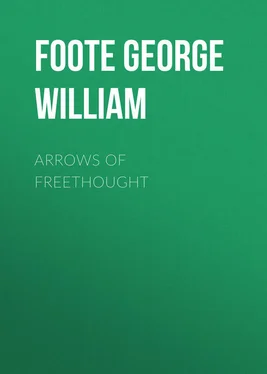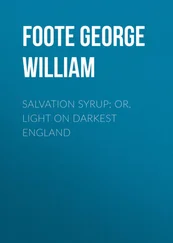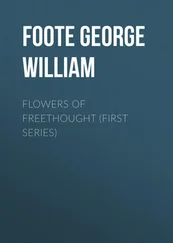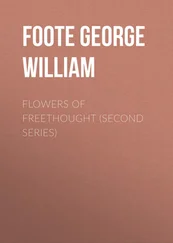George Foote - Arrows of Freethought
Здесь есть возможность читать онлайн «George Foote - Arrows of Freethought» — ознакомительный отрывок электронной книги совершенно бесплатно, а после прочтения отрывка купить полную версию. В некоторых случаях можно слушать аудио, скачать через торрент в формате fb2 и присутствует краткое содержание. Жанр: foreign_antique, foreign_prose, на английском языке. Описание произведения, (предисловие) а так же отзывы посетителей доступны на портале библиотеки ЛибКат.
- Название:Arrows of Freethought
- Автор:
- Жанр:
- Год:неизвестен
- ISBN:нет данных
- Рейтинг книги:5 / 5. Голосов: 1
-
Избранное:Добавить в избранное
- Отзывы:
-
Ваша оценка:
- 100
- 1
- 2
- 3
- 4
- 5
Arrows of Freethought: краткое содержание, описание и аннотация
Предлагаем к чтению аннотацию, описание, краткое содержание или предисловие (зависит от того, что написал сам автор книги «Arrows of Freethought»). Если вы не нашли необходимую информацию о книге — напишите в комментариях, мы постараемся отыскать её.
Arrows of Freethought — читать онлайн ознакомительный отрывок
Ниже представлен текст книги, разбитый по страницам. Система сохранения места последней прочитанной страницы, позволяет с удобством читать онлайн бесплатно книгу «Arrows of Freethought», без необходимости каждый раз заново искать на чём Вы остановились. Поставьте закладку, и сможете в любой момент перейти на страницу, на которой закончили чтение.
Интервал:
Закладка:
Here the matter might rest, but we are inclined to urge another consideration. No one of his many enemies ever accused Paine of licentiousness in his virile manhood; and can we believe that he began a career of licentiousness in his old age, when, besides the infirmities natural to his time of life, he suffered dreadful tortures from an internal abscess brought on by his confinement in the reeking dungeons of the Luxembourg, which made life a terror and death a boon? Only lunatics or worse would credit such a preposterous story.
The Athenoum critic alleges that Paine insulted Washington, and was therefore a "thorough-paced rascal." But he did nothing of the kind. He very properly remonstrated with Washington for coolly allowing him to rot in a French dungeon for no crime except that he was a foreigner, when a word from the President of the United States, of which he was a citizen, would have effected his release. Washington was aware of Paine's miserable plight, yet he forgot the obligations of friendship; and notwithstanding frequent letters from Munro, the American ambassador at Paris, he supinely suffered the man he had once delighted to honor to languish in wretchedness, filth, and disease. George Washington did much for American Independence, but Thomas Paine did perhaps more, for his writings animated the oppressed Colonists with an enthusiasm for liberty without which the respectable generalship of Washington might have been exerted in vain. The first President of the United States was, as Carlyle grimly says, "no immeasurable man," and we conceive that Paine had earned the right to criticise even him and his policy.
Every person is of course free to hold what opinion he pleases of Paine's writings. The Athenoum critic thinks they have "gone the way of all shams." He is wrong in fact, for they circulate very extensively still. And he may also be wrong in his literary judgment. William Hazlitt, whose opinion on any subject connected with literature is at least as valuable as an Athenoum critic's, ranked Paine very high as a political writer, and affirmed of his "Rights of Man" that it was "a powerful and explicit reply to Burke." But Hazlitt had read Paine, which we suspect many glib critics of to-day have not; for we well remember how puzzled some of them were to explain whence Shelley took the motto "We pity the Plumage, but Forget the Dying Bird" prefixed to his Address to the People on the death of the Princess Charlotte. It was taken, as they should have known, from one of the finest passages of the "Rights of Man." Critics, it is well known, sometimes write as Artemus Ward proposed to lecture on science, "with an imagination untrammeled by the least knowledge of the subject."
Let us close this vindication of Paine by citing the estimate of him formed by Walt Whitman, an authority not to be sneered at now even by Athenoum critics. In 1877 the Liberal League of Philadelphia celebrated the 140th birthday of Thomas Paine, and a large audience was gathered by the announcement that Whitman would speak. The great poet, according to the Index report, after telling how he had become intimate with some of Paine's friends thirty-five years before, went on to say: —
"I dare not say how much of what our Union is owning and enjoying to-day, its independence, its ardent belief in, and substantial practice of, Radical human rights, and the severance of its Government from all ecclesiastical and superstitious dominion – I dare not say how much of all this is owing to Thomas Paine; but I am inclined to think a good portion of it decidedly is. Of the foul and foolish fictions yet told about the circumstances of his decease, the absolute fact is that, as he lived a good life after its kind, he died calmly, philosophically, as became him. He served the embryo Union with the most precious service, a service that every man, woman, and child in the thirty-eight States is to some extent receiving the benefit of to-day, and I for one here cheerfully and reverently throw one pebble on the cairn of his memory."
We are content to let the reader decide between Whitman and the Athenoum critic in their respective estimates of him who wrote, and as we think acted up to it – "All the world is my country, and to do good my religion."
THE GOSPEL OF FREETHOUGHT
(August, 1882.)
Christians are perpetually crying that we destroy and never build up. Nothing could be more false, for all negation has a positive side, and we cannot deny error without affirming truth. But even if it were true, it would not lessen the value of our work. You must clear the ground before you can build, and plough before you sow. Splendor gives no strength to an edifice whose foundations are treacherous, nor can a harvest be reaped from fields unprepared for the seed.
Freethought is, in this respect, like a skilful physician, whose function it is to expel disease and leave the patient sound and well. No sick man claims that the doctor shall supply him with something in place of his malady. It is enough that the enemy of his health is driven out. He is then in a position to act for himself. He has legs to walk with, a brain to devise, and hands to execute his will. What more does he need? What more can he ask without declaring himself a weakling or a fool? So it is with superstition, the deadliest disease of the mind. Free-thought casts it out, with its blindness and its terrors, and leaves the mind clear and free. All nature is then before us to study and enjoy. Truth shines on us with celestial light, Goodness smiles on our best endeavors, and Beauty thrills our senses and kindles our imagination with the subtle magic of her charms.
What a boon it is to think freely, to let the intellect dart out in quest of truth at every point of the compass, to feel the delight of the chase and the gladness of capture! What a noble privilege to pour treasures of knowledge into the crucible of the brain, and separate gold from the dross!
The Freethinker takes nothing on trust, if he can help it; he dissects, analyses, and proves everything. Does this make him a barren sceptic? Not so. What he discards he knows to be worthless, and he also knows the value of what he prizes. If one sweet vision turns out a mirage, how does it lessen our enjoyment at the true oasis, or shake our certitude of water and shade under the palm trees by the well?
The masses of men do not think freely. They scarcely think at all out of their round of business. They are trained not to think. From the cradle to the grave orthodoxy has them in its clutches. Their religion is settled by priests, and their political and social institutions by custom. They look askance at the man who dares to question what is established; not reflecting that all orthodoxies were once heterodox, that without innovation there could never have been any progress, and that if inquisitive fellows had not gone prying about in forbidden quarters ages ago, the world would still be peopled by savages dressed in nakedness, war-paint, and feathers. The mental stultification which begins in youth reaches ossification as men grow older. Lack of thought ends in incapacity to think.
Real Freethought is impossible without education. The mind cannot operate without means or construct without materials. Theology opposes education: Freethought supports it. The poor as well as the rich should share in its blessings. Education is a social capital which should be supplied to all. It enriches and expands. It not only furnishes the mind, but strengthens its faculties. Knowledge is power. A race of giants could not level the Alps; but ordinary men, equipped with science, bore through their base, and made easy channels for the intercourse of divided nations.
Growth comes with use, and power with exercise. Education makes both possible. It puts the means of salvation at the service of all, and, prevents the faculties from moving about in vacuo , and finally standing still from sheer hopelessness. The educated man has a whole magazine of appliances at his command, and his intellect is trained in using them, while the uneducated man has nothing but his strength, and his training is limited to its use.
Читать дальшеИнтервал:
Закладка:
Похожие книги на «Arrows of Freethought»
Представляем Вашему вниманию похожие книги на «Arrows of Freethought» списком для выбора. Мы отобрали схожую по названию и смыслу литературу в надежде предоставить читателям больше вариантов отыскать новые, интересные, ещё непрочитанные произведения.
Обсуждение, отзывы о книге «Arrows of Freethought» и просто собственные мнения читателей. Оставьте ваши комментарии, напишите, что Вы думаете о произведении, его смысле или главных героях. Укажите что конкретно понравилось, а что нет, и почему Вы так считаете.











